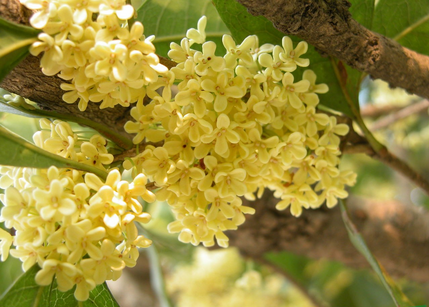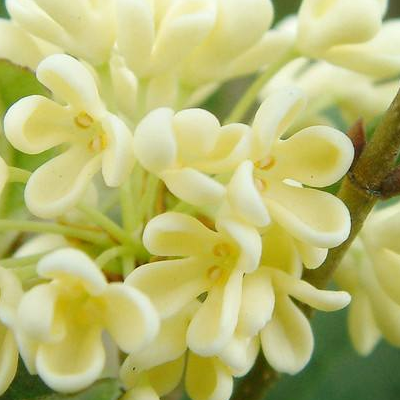How to graft sweet-scented osmanthus
How to graft sweet-scented osmanthus, sweet-scented osmanthus is one of the top ten famous flowers in China. Sweet-scented osmanthus is evergreen all the year round, full of fragrance and fragrance, making it the crown of all flowers. Sweet-scented osmanthus is not only a garden tree species for greening, beautification and fragrance of the environment, but also an economic tree species for special use in spices, food, wine, medicine and so on. Hangzhou, Suzhou, Guilin, Hefei and other cities all over the country regard sweet-scented osmanthus as city flowers and need to develop seedlings in short supply. There are many ways to reproduce sweet-scented osmanthus. In the past, it was mainly propagated by seeds, but the offspring varied greatly and flowered very late. Grafting propagation can develop excellent varieties, bloom 6 ~ 8 years earlier than seedlings, improve stress resistance and expand the planting range of sweet-scented osmanthus.
Cultivation and selection of rootstock and scion
There are many kinds of sweet-scented osmanthus rootstocks. At present, the commonly used rootstocks are lobular privet, privet, tassel, lobular white wax and sweet-scented osmanthus seedlings. Among them, the survival rate of lobular privet grafting was high and grew fast at the initial stage, but the small foot phenomenon appeared in the later stage of rootstock growth. It is necessary to reduce the interface position when grafting and bury the soil deeply when planting so that it can take root by itself. Fimbriate rootstock can improve cold resistance and saline-alkali resistance. The grafting affinity of Osmanthus fragrans seedlings is the best. Rootstocks are raised in the nursery, usually 1-year-old seedlings are grafted. The scion is made of fresh thick branches and grafted with picking.
Grafting method
Spring branch grafting is generally used, and skin grafting and cutting grafting are available. In order to promote self-rooting of scion, it is better to use the method of basal ventral grafting. If the scion is inserted 3 cm from the ground of the rootstock, the scion can not leave leaves, but also can retain 1 leaf or 2 leaves. But after inserting the incision of the rootstock, it should be wrapped with ultra-thin plastic film, and then the lower part of the plastic film is synthesized into a rope to tie up the interface tightly. When the rootstock is grafted, the growth of the rootstock is controlled, and the other leaves are retained. After the scion germinates and grows, the rootstock above the interface is cut off. The above is the method of grafting sweet-scented osmanthus.
How to graft sweet-scented osmanthus
Many people have heard of grafted plants, but they may not have really put it into practice. In fact, grafting is not as difficult as people think, we only need to understand the whole process, then we can fully grasp the essence of it. Next we will introduce how to graft sweet-scented osmanthus.

How to graft sweet-scented osmanthus
How to graft sweet-scented osmanthus-time
Grafting sweet-scented osmanthus needs to choose the right time. Sweet-scented osmanthus grows vigorously from March to June, or is stable from September to October, during which grafting can be carried out. On the whole, it is suggested that we should choose a warm time to graft sweet-scented osmanthus. Sweet-scented osmanthus can be grafted more smoothly in a warm environment without having to worry about decay or freezing injury.
Second, how to graft sweet-scented osmanthus-process
First of all, choose sticky wood, you can use cactus as sticky wood, the trunk of cactus is more stopped and has a good support, at the same time sweet-scented osmanthus and cactus look better with each other. Cut off a branch of sweet-scented osmanthus and cut it in the sand bed planted by cactus. When cutting branches, you can wait until the cut is slightly dry and there is no mucus before cutting, which will be more stable.
Third, how to graft sweet-scented osmanthus-- maintenance
After grafting sweet-scented osmanthus needs to pay attention to follow-up maintenance, at the beginning to maintain its ventilated environment, and then wait until rooting can start watering, but be careful not to touch the interface. [tassel grafted sweet-scented osmanthus] tassel grafted sweet-scented osmanthus picture _ price
.. when it comes to sweet-scented osmanthus, many people are not interested in it. The breeding method of sweet-scented osmanthus mainly depends on grafting, so it is very important to choose a good grafting secret book. Do you know tassel tree grafting sweet-scented osmanthus? Today, the editor will briefly introduce the price and appreciation of Osmanthus fragrans grafted on tassel trees. All kinds of decorative flowers! Highlight the high-end taste of life! Click to view > >. Sweet-scented osmanthus trees can produce fragrant sweet-scented osmanthus in autumn, and sweet-scented osmanthus planting is becoming more and more popular. Most of the sweet-scented osmanthus seedlings are planted by grafting, and many choose tassel trees to graft sweet-scented osmanthus to propagate sweet-scented osmanthus. The combing price of sweet-scented osmanthus grafted by tassel trees is not expensive. The price of small seedlings is 89.9 yuan, and the seedlings of large trees are only more than ten yuan. . there are many methods of sweet-scented osmanthus grafting, among which the grafting method is commonly used in potted sweet-scented osmanthus in China. Its advantages are: long time for grafting, easy to survive, fast forming and early flowering. The main points of sweet-scented osmanthus grafting techniques are as follows: 1. The rootstock species used for cultivating rootstocks and grafting sweet-scented osmanthus are privet, tassel tree (fimbriate tree grafting sweet-scented osmanthus) and so on. The rootstocks for grafting should be robust and free from diseases and insect pests, 2-3-year-old seedlings with a diameter of more than 1 cm or 2-3-year-old branches on perennial trees. 2. The varieties of osmanthus osmanthus scion are Jin Gui, Yin Gui, Dan Gui, Siji Gui and so on. First of all, sweet-scented osmanthus varieties can be selected according to their preferences and resource conditions, and then the 2-to 3-year-old branches with strong growth, full development, no disease and insect pests and moderate size can be selected as scions. .1. Grafting sweet-scented osmanthus on tassel trees is a common method of grafting sweet-scented osmanthus. Now the editor will take you to a simple understanding that branches, cushions, frames, hanging, binding and other methods can be used to get close to the branches of sweet-scented osmanthus selected as scions and rootstocks. Then determine the suitable grafting position of rootstock and scion, and fix the position. 2. The cutting interface slope is respectively cut at the grafting position between the rootstock and the scion. The slope is oval in shape, with a length of 3 to 5 cm, and the depth of the slope is generally no more than half of the thickness of the branch. .3. After the grafting and binding of the cutting stock is completed, cut off the branches of the rootstock from 1 cm above the interface. 4. After grafting, if the branches sprout below the interface of the rootstock, they should be erased in time. From 31 to 35 days after grafting, the scion was cut off from the interface and separated from the mother. 5. Check the survival 3-5 days after cutting off the scion, the scion branches and leaves grow normally is the survival, if the leaves wilt, it is necessary to repair. . after saying that tassel trees are grafted with sweet-scented osmanthus, let's talk about the garden of sweet-scented osmanthus. Sweet-scented osmanthus blossoms in autumn and is full of fragrance. It is widely used in gardens, often as landscape trees, including isolated planting, opposite planting, and forest planting in clumps. In Chinese classical gardens, sweet-scented osmanthus is often matched with buildings, mountains and stone machines, with tufted shrub plants planted near pavilions, platforms, buildings and pavilions. Old-style gardens are often planted, known in ancient times as "Shuanggui Dangtong" or "Shuanggui Liufang". Sweet-scented osmanthus is evergreen all the year round, luxuriant branches and leaves, sweet-scented osmanthus fragrance, containing a variety of spice substances, can be used to eat or extract spices. That's all for today's introduction of the price of tassel tree grafting sweet-scented osmanthus. Thank you for your appreciation.
- Prev

Cutting techniques of Osmanthus fragrans
For the cutting technology of sweet-scented osmanthus trees, sweet-scented osmanthus trees are often cut in spring, plum season or autumn, but plum cuttings are mostly used in the south, which can take root quickly and have a high survival rate. The specific cutting time varies due to local climate and fertilizer and water management. the best cutting time is based on the semi-Lignification of spring shoots and summer shoots.
- Next

Grafting method of Osmanthus fragrans
Osmanthus fragrans grafting method, sweet-scented osmanthus grafting, mainly branch grafting. In Wuhan and Nanjing, the best grafting period is from late March to April. At this time, the rootstock began to find new buds, the sap flowed and healed quickly after grafting.
Related
- Fuxing push coffee new agricultural production and marketing class: lack of small-scale processing plants
- Jujube rice field leisure farm deep ploughing Yilan for five years to create a space for organic food and play
- Nongyu Farm-A trial of organic papaya for brave women with advanced technology
- Four points for attention in the prevention and control of diseases and insect pests of edible fungi
- How to add nutrient solution to Edible Fungi
- Is there any good way to control edible fungus mites?
- Open Inoculation Technology of Edible Fungi
- Is there any clever way to use fertilizer for edible fungus in winter?
- What agents are used to kill the pathogens of edible fungi in the mushroom shed?
- Rapid drying of Edible Fungi

